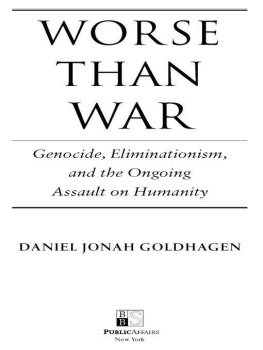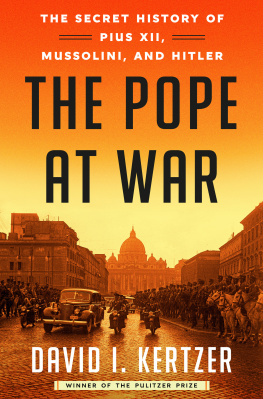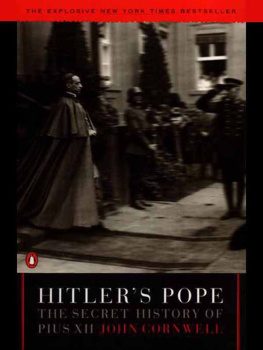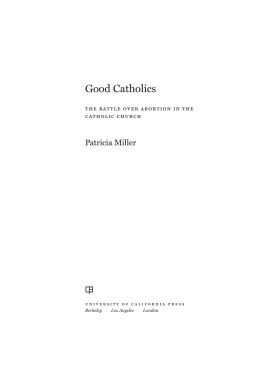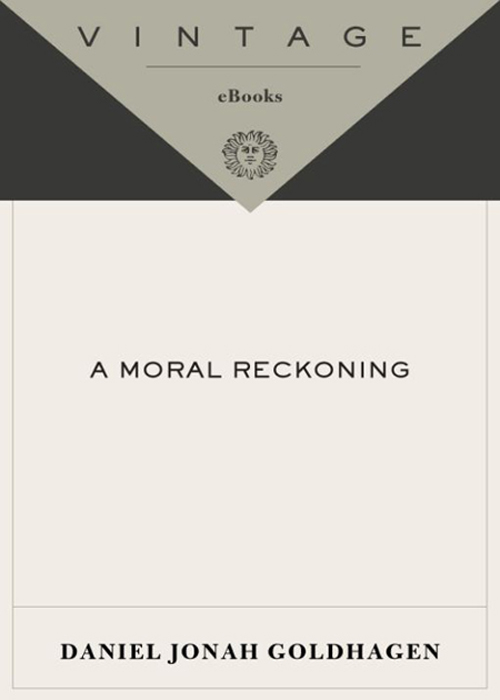
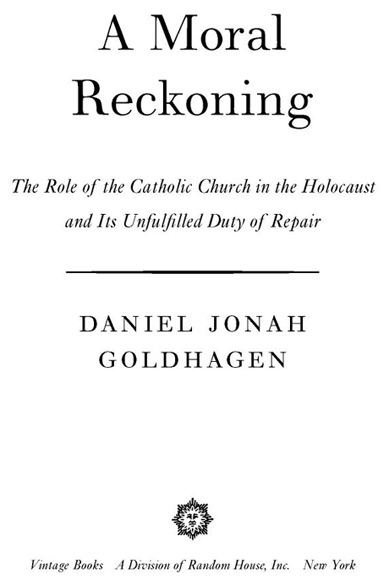
Table of Contents
To Sarah
We feel We owe no greater debt to Our office and to Our time than to testify to the truth with Apostolic Firmness: to give testimony to the truth.... In the fulfillment of this, Our duty, we shall not let Ourselves be influenced by earthly considerations...
Pius XII, Summi Pontificatus (October 20, 1939)
INTRODUCTION
FRAMING the Problem
TheShoah was the work of a thoroughly modern neopagan regime. Its antisemitism had its roots outside of Christianity...
Holy Sees Commission for Religious Relations with the Jews, We Remember: A Reflection on the Shoah (March 1998)
Christian anti-Judaism did lay the groundwork for racial, genocidal antisemitism by stigmatizing not only Judaism but Jews themselves for opprobrium and contempt. So the Nazi theories tragically found fertile soil in which to plant the horror of an unprecedented attempt at genocide.
United States Catholic Conference, Catholic Teachingon the Shoah: Implementing the Holy Sees We Remember (2001)
CHRISTIANITY IS A RELIGION of love that teaches its members the highest moral principles for acting well. Love your neighbor. Seek peace. Help those in need. Sympathize with and raise up the oppressed. Do to others as you would have them do to you.
Christianity is a religion that consecrated at its core and, historically, spread throughout its domain a megatherian hatred of one group of people: the Jews. It libelously deemed them, sometimes in its sacred texts and doctrine, to be Christ-killers, children of the devil, desecrators and defilers of all goodness, responsible for an enormous range of human calamities and suffering. This hatredChristianitys betrayal of its own essential and good moral principlesled Christians, over the course of almost two millennia, to commit many grave crimes and other injuries against Jews, including mass murder. The best-known and largest of these mass murders is the Holocaust.
The question for Christians, especially for the Catholic Church, is, What must a religion of love and goodness do to confront its history of hatred and harm, to make amends with its victims, and to right itself so that it is no longer the source of a hatred and harm that, whatever its past, it would no longer endorse? This is the question also of this book.
WHO DID WHAT? Why did they do it? In what ways are they culpable? These are the three big questions of the Holocaust. In Hitlers Willing Executioners:Ordinary Germans and the Holocaust, I tackled the first two questions, focusing on the ordinary Germans who were the principal perpetrators of the Holocaust and showing that they slaughtered Jews because, moved by antisemitism, they believed that killing them was just, right, and necessary. For this reason the book left untouched the third, equally explosive subject of moral culpability. It also did not take up the principal post-Holocaust questions: Who is responsible for making amends with the victims, and what must they do?
In Hitlers Willing Executioners I presented no explicit moral judgments about culpability and no program of repair. It was, of course, obvious that I condemn the Germans and their helpers eliminationist persecution and mass murder of the Jews and their persecution and slaughter of other victim groups, including the mentally ill, Roma and Sinti (commonly called Gypsies), homosexuals, asocials, Poles, Russians. When the book appeared at the end of March 1996, those, especially in Germany, who abhorred the airing of the obscured facts and unwelcome truths that it contained attacked the book and me personally, including by leveling the fictitious charge that I was explicitly passing the moral judgment of collective guilt. These attacks, many manifestly disreputable, did, however, indicate something fundamental that lay behind the large furor around the book, something that deserves our attention.
Hitlers Willing Executioners unwittingly provoked a moral uproar, and a moral subtext continually envelopedand partly derailedthe extensive written and verbal discussion around the book. The book sought to restore to Germans their humanity, which had heretofore generally been denied them by the standard dehumanizing characterization of them as thoughtless, automatonlike cogs in a machine. It therefore challenged the existing conventional view, and pointedly insisted that Germans be seen and treated for what they were: individual moral agents. It investigated their views of Jews, and of the justness of the eliminationist persecution, including physical annihilation. It brought forth and emphasized critical information that had for long been denied, obscured, and covered upeven though some of the information had for decades been availablethat so many of the perpetrators knew that they could avoid killing but chose to torture and to kill their victims, and were often demonstrably gleeful about it. It showed that the conventional notion that the German people in general were terrorized is a myth and that, exceptions notwithstanding, Germans essentially assented to the violent eliminationist persecution of the Jews. All of this, however implicitly, forcefully made unavoidable the previously widely avoided moral question: Who is culpable, in what way, and for what?
Germans and people in other countries were suddenly grappling with the problems of moral judgment in a way that many of them never had; human beings had replaced abstract structures and impersonal forces as actors, and they, Germans and others, were shown to have been animated by views that most people today abhor, and, in substantial numbers, to have willfully done terrible, criminal things. The facile moral excuses and rationalizations that Germans had been terrorized, had not known about the crimes, and so onthat had exculpated so many people and comforted so many more were, however implicitly, exposed as hollow. Moral charges were in the morally charged air.
Because of the barrage of false views imputed to me, I wrote a foreword to the German edition of the book (since reprinted in other editions, including the English-language paperbacks) that contained the following: Because the analysis of this book emphasizes that every individual made choices about how to treat Jews, its entire mode of analysis runs contrary to, and provides powerful argument against, any notion of collective guilt. I clarified, if briefly, my views about collective guilt, which I have always emphatically rejected, but the question of how we might judge the perpetrators and other involved people for their actions during this periodthe moral issuesI left aside, so in the discussion about my book they remained mainly subterranean.
It is true that in answering the first two principal questions of the Holocaustwho did what, and why did they do it?the book provided the necessary foundation for answering the third question: In what ways are they culpable? It also makes it possible to move to the next stage of investigationthe post-Holocaust stagewhich is to ask: Based on the answers to these three principal questions, what social, political, and moral responses and measures should we conclude are desirable or even necessary? That Hitlers Willing Executioners implied and set the stage for such a further investigation was recognized by Jrgen Habermas. In his speech Goldhagen and the Public Use of History Habermas explained:
Goldhagens investigations are tailored to address precisely those questions that have polarized our public and private discussions for the past half century.... The truly fundamental question at issue [is]: What does it mean to assign the responsibility for historical crimes retrospectivelyif it is just this reckoning that we are now undertaking with the goal of generating an ethical-political process of public self-understanding? Goldhagen provides a new stimulus to a reflection about the proper public use of history.
Next page

